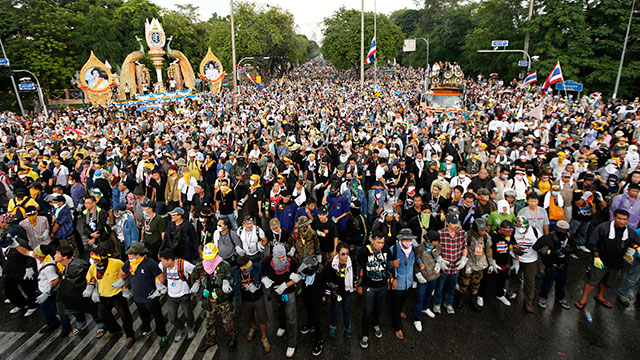SUMMARY
This is AI generated summarization, which may have errors. For context, always refer to the full article.

BANGKOK, Thailand (2nd UPDATE) – Thailand’s embattled premier on Monday, November 25, invoked a special security law in the capital Bangkok and nearby areas after protesters stormed key ministries in a bid to topple the government.
“While the government will enforce the laws it will not use force against the people,” Prime Minister Yingluck Shinawatra said as she announced the decision to impose the Internal Security Act in the entire capital.
“The government would like to ask people not to join illegal protests and to respect the law,” she added.
Thai opposition demonstrators on Monday stormed two key government ministries in the capital in a dramatic escalation of their efforts to topple embattled Prime Minister Yingluck Shinawatra.
The mass protests against Yingluck and her brother, ousted premier Thaksin Shinawatra, are the biggest since 2010 when the kingdom was rocked by its worst political bloodshed in decades with more than 90 civilians killed.
The turmoil has raised fears of a fresh bout of street violence in a country that has been convulsed by several episodes of political unrest since royalist generals overthrew Thaksin in a coup in 2006.
Tens of thousands of protesters opposed to Yingluck’s elected government marched on more than a dozen state agencies across Bangkok, including military and police bases, as well as several television stations.
Hundreds of demonstrators swarmed into finance ministry buildings and later forced their way into the foreign ministry compound, which were both apparently left unguarded by government security forces.
Demonstrators broke down the gates to the foreign ministry and after occupying an area of the compound they asked civil servants to leave and not to return to work the next day, according to a ministry spokesman.
“It was a peaceful seizure by the people,” protest leader Suthep Thaugsuban said at a press conference from the finance ministry, calling for the occupation on Tuesday of “all government agencies”.
“The Thaksin system can no longer work,” he said, vowing to defy police warnings for the protesters to leave the ministry.
Suthep, a veteran politician who has delivered rabble-rousing speeches for the near month-long protest, said future “political reform” would be decided by the protesters.
Some of the demonstrators had earlier called for the intervention of the military in a country that has seen 18 actual or attempted coups since it became a constitutional monarchy in 1932.
A boisterous rally on Sunday brought up to 180,000 anti-government demonstrators to the streets of Bangkok, according to the National Security Council.
Thousands of pro-government “Red Shirts” remain in a suburban football stadium in Bangkok in a show of support for Yingluck and Thaksin.
The rallies are the biggest challenge yet for Yingluck, who swept to power in elections in 2011 thanks to support from the Red Shirts, whose protests in 2010 were crushed by the then-government led by the Democrat party.
Yingluck on Monday told reporters she would neither resign nor dissolve parliament despite the mounting pressure.
But experts said she is running out of room to maneuver.
“It will be very difficult for Yingluck to stay in office, let alone get anything done,” said Thitinan Pongsudhirak, director of the Institute of Security and International Studies at Bangkok’s Chulalongkorn University.
The Thai capital has faced weeks of opposition-backed rallies sparked by an amnesty bill that could have allowed the return of Thaksin from self-imposed exile.
The amnesty bill – which was rejected by the upper house of parliament – also angered Thaksin’s supporters because it would have pardoned those responsible for the 2010 military crackdown on their rallies.
Former premier Abhisit Vejjajiva – now the opposition leader – and his deputy Suthep face murder charges for overseeing the military operation.
In another blow to the government, the Constitutional Court last week blocked the ruling party’s plans for a fully elected Senate.
The opposition Democrat Party is seeking to raise the pressure on Yingluck with a no-confidence debate on Tuesday – although her party dominates the lower house.
Thaksin, a billionaire telecoms tycoon-turned-politician, draws strong support from many of the country’s rural and urban working class. But he is loathed by the elite and the middle classes, who accuse him of being corrupt and a threat to the monarchy.
“Yingluck, Thaksin, their party and their corrupt system must go this week,” demonstrator Thanabhum Prompraphan, 50, told Agence France-Presse.
“This is real people power. We will stay peaceful…whistles are our weapons,” he said.
A series of protests by the royalist “Yellow Shirts” helped to trigger the coup that toppled Thaksin, who now lives in self-imposed exile in Dubai to avoid a prison term for corruption that he contends was politically motivated.
King Bhumibol Adulyadej, 85, is widely revered in Thailand but has been in ill-health for several years and the palace has been silent over the organization of his eventual succession. – Rappler.com
Add a comment
How does this make you feel?
There are no comments yet. Add your comment to start the conversation.